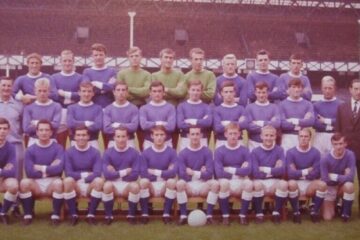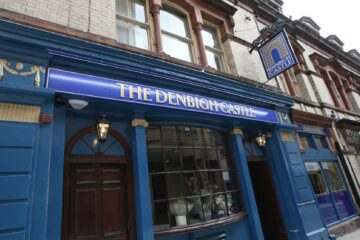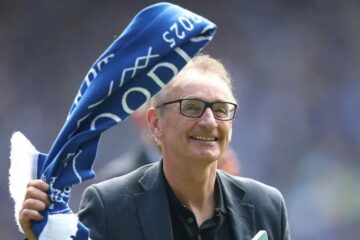Steve Zocek
BBC Television once aired a weekly programme called the Wednesday Play. One particular episode was called The Golden Vision, which related to the Everton idol Alex Young. Many of the actors featured were well known performers from Liverpool, but the series was also notable for featuring complete unknowns, and people from ordinary walks of life with no acting experience whatsover, a technique deployed by director Ken Loach throughout his long career.
The programme, aired on 17 April 1968, represented a fanatical bunch of Evertonians, who obsessively followed the Toffees. Nuneaton-born Ken Loach, was educated at St. Peter’s College, Oxford, and was already responsible for several productions, having made his mark with two previous Wednesday Play episodes; Up the Junction (1965) and Cathy Come Home (1966). Either side of The Golden Vision, (his ninth Wednesday Play), he achieved wider and lasting acclaim after his move into feature films, directing Poor Cow (1967) and the now classic Kes (1969). Nor was he new to the local area, having directed three episodes of Z-Cars in 1964.
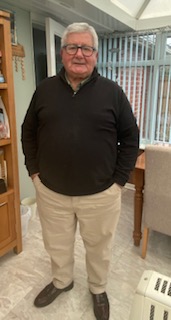
Steve Zocek in Conversation with John Munro
The Golden Vision featured John Munro (now residing in Southport), who was a member of the Everton Supporters Club in City Road, only footsteps away from Goodison Park. John was born an Aberdonian although his mother originated from Bootle. His father played football for a feeder team in Aberdeen called Lewis United, a junior side from the area. The team was associated with the shipbuilding company, so if you were in the team, it also gave you a job. Lewis United once reached the Scottish Junior Cup Semi-Final, which in those days was a huge achievement. John took up the story,
My father eventually came down to England and got a job with C & H Crighton, the ship builders in Liverpool. He had already been what was known as a scaler in the Royal Navy.
He described his first visit to Goodison Park,
In 1951, I was two and a half years of age when my father took me to my first game at Goodison Park against Aston Villa. We lost that day and got relegated at the end of that season. My father then told me I was a jinx. He still took me as my mother wouldn’t let him go without me!
I was then taken to every home game from then on, and my father used to go to the games with his brother, my Uncle Ted. They, like many back then, would go to Everton one week, and across the Park the week later. My father preferred Everton because they played a brand of football which he adored. My father always preferred to stand in the Park End of the stadium, so my uncle took me onto the terraces in Goodison Road. I believe that terrace back then held 26,000 people, it was huge. At each corner of Goodison there was a police box. The Police were supposed to sit in them but didn’t, instead they would patrol around the pitch. My uncle would put me in the box which was also occupied by a few more youngsters, but if you were at the ground early, you would get into the box.
Regarding his first away game, John said,
My first away game was at Oldham Athletic’s Boundary Park, the day we got promoted to the old First Division. To this day, it’s the biggest Everton following I have ever seen. There were more outside than there were inside. It was incredible. We had to win 6-0 to come top of the league. Leading at the break four goals in front, the fans were filled with excitement, but our team failed to capitalise on that in the second half. We were promoted, of course, as runners up and have never tasted relegation since.
John and his father remained dedicated to their beloved Blues, when one day in October 1958, Everton, who were in a transition period of managers, faced Tottenham Hotspur at White Hart Lane. Spurs had just appointed Bill Nicholson who went on to have a flourishing career with the club, spending a remarkable sixteen years at the helm in North London. Nicholson also represented England as a player, making his full international debut on 19 May 1951 against Portugal at Goodison Park, finding the net with his first touch of the ball after just nineteen seconds.
John recalled,
I reached the age of ten and Everton were playing away at Tottenham on 11 October 1958. My father told me that this would be my first trip to the capital. He had a soft spot for Spurs because they too, like us, played some good football back then. That was the fateful day we lost to their biggest win, a result of 10-4.
My father also had a mate who drove a taxi and would occasionally take us to some of the away games. In those days, taxis had an opening on the side where passengers would store their suitcases. I would have to sit in that area being strapped in as the vehicle seated five.
John was very fortunate to attend Everton’s Inter Cities away game at Dunfermline, although this was not so fortunate on the pitch, as he witnessed their exit from the competition at the first hurdle over the two-legged tie. The following season, John was taken on an adventure, as Everton had entered the big European competition representing England for achieving the Football League Championship the previous season.
At the age of fourteen, my father took me abroad on an aeroplane for the very first time, as we went to watch Everton against Inter Milan. As everybody knows, Colin Harvey made his Everton debut. I was a schoolboy back in those days and I have to say my school days were absolutely brilliant. I loved watching Everton back then; I loved every minute of it. I had a teacher at the school, Mr, Callan, we all called him Tom. He, like me, was an Evertonian who lived in Maghull. There was an occasion where tickets went on sale for a big match and Tom asked me if I was going to Goodison to queue up for tickets. I told him that I was and my father would come and take over from me when he finished work. The tickets went on sale at 5pm to give the working man a chance to get there. That Friday morning, Tom asked me if I would get his ticket too, which meant he let me out at 10am that morning.”
We now reach a very special moment in John’s life when he started to taste ‘fame.’ Towards the end of the sixties, John had made many acquaintances who all had one thing in common: Everton.
There were around ten of us going to the away games for a long, long time. There was a guy who had a Ford Thames trader mini bus who was actually a Kopite, but one of the lads worked with him. His minibus took us to the away games as he would take out all of the seats and replace them with a mattress. There was also a piece of furniture in there that was called a cottage suite, which was situated right against the back doors. We would enter the vehicle through the side, with the first two in getting the first option of the suite. George Bailey was the chairman of the Supporters club in City Road, assisted by the secretary Gerry Thompson. One day, Gerry asked us if we were going down to Arsenal. We replied yes. He asked if we fancied getting recorded for the TV documentary called ‘The Golden Vision.’ We were already aware of the documentary and were told we would be in the scene with Joey Kaye, who was a local actor/comedian. We were told we had to meet Ken Loach (the director) in a café at Euston Station at a certain time.
John Munro, along with his associates, arrived in good time, and Ken Loach then walked into the café to greet everybody and bought them snacks and drinks.
He then set on to us about what we were supposed to do. He made us aware that there would be a train arriving. He would give us a platform ticket each. He wanted us to go in, board the train and when it stopped, all of us jump out and start clapping. We were told that Joey Kaye would be on the platform waiting for us. Getting onto that train was horrendous, with men and women going to work, telling us we couldn’t get on, as they were doing the opposite, it was quite hilarious. We all managed to get on board eventually. We didn’t think it was going to be in the finished article, but it was. We were all coming down the station with Joey Kaye, singing the ‘The Goodison Gang.’ That anthem is a very old song, but we picked it up somewhere on our travels. We were given the sum of £10 each for playing that role. This was not a bad fee considering I was earning £4 weekly back then. It had been arranged for us to go to Luton Town Supporters Club, (also the base for the official England supporters club) on our journey home. It was great, because I ordered a whisky and was able to pay for it out of the fee.
John spoke about who would be his all-time Everton favourite, and without hesitation, Alex Young was the name that came with ease. Another name that he spoke of with affection was another talented Scotsman called Tommy Ring, an Everton winger from 1960 to 1961.
Over the years of watching his beloved team, John recalled his most memorable games,
Liverpool 4-4 in round 5 of the FA Cup replay in February 1991 was a classic, as was the European semi-final against the giants Bayern Munich in 1985.
Those fortunate to witness both encounters I’m sure would agree.
The club have always been known for their entertaining football and huge crowds. Under the Chairmanship of millionaire John Moores, who demanded nothing but the best, famously said, “Everton expects success. We’ve a very good crowd and our crowd are very loyal. But, of course, they pay money and they expect to see us do well. If we don’t do well then something should be done about it – and something will be done about it.”
On 27 December 1960, a crowd of 74,867 squeezed inside Goodison for the visit of Burnley. John Munro said, “Fans had to climb the wall to sit on the track to avoid any possibility of a tragedy.’’
The Liverpool Echo carried the headline on the sports page:
POLICE CARRY YOUNGSTERS FROM SWAYING CROWD AT GOODISON PARK. AMBULANCE MEN DEAL WITH MANY FAINTING CASES AMONG THE MANY 75,000 SPECTATORS
While the club’s reaction in bold letters read,
Discussion by Board
Commenting on the crushing and crowding at Goodison Park yesterday, the Everton chairman Mr. John Moores said,
“I must admit there was a little overcrowding in certain parts of the ground. This is a matter I want the board to discuss to see how it can be alleviated. I was disappointed how we lost rather tamely, when support from spectators was so excellent.”
John Munro was also fortunate to be present at the World Cup matches at Goodison Park in 1966, having obtained a block ticket covering all of the games played there. Disappointment was to follow, as England had their semi-final match moved from the north west to the capital, but he was able to purchase a ticket for the final in July.
1966 was a good year, with Everton winning the FA Cup in May, and Bobby Moore lifting the Jules Rimet trophy at the end of July. “It was a great time to be an Evertonian and for the country itself,“ said John.
He also had the good fortune to see Henry Cooper fight Cassius Clay (Muhammad Ali) at Highbury, and even saw him in Hyde Park wearing a white tracksuit.
………………………………………….
The Golden Vision – The Production
Ken Loach – Director
One of the first actors that Ken Loach worked with in the sixties was Neville Smith. He was a Liverpudlian by birth, but a strong Evertonian. The two got on well, Smith often talking about Everton and Goodison Park.
Speaking to Steve Zocek, Loach recalled,
Neville had appeared in a couple of films, and we actually spoke about him writing one about Everton. It was going to be half fiction, about the fans and the importance of the club to them, with the other half being a documentary element. Neville actually wrote it – he had never written a play before. He worked with Gordon Honeycombe, who was a broadcaster, but the work was really credited to Neville.
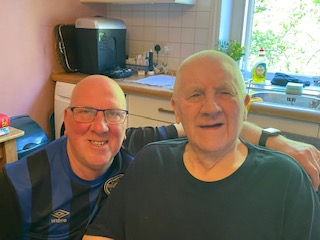
He continued,
The commission was done for the Wednesday Play and we made it. There were two things that were quite extraordinary, first of all we worked with a bunch of Liverpool comics. Billy Dean, Joey Kaye, Mike Hayden, a whole range of them. The culture that the comics brought was the culture of the working men’s club. They would be telling jokes from 8am in the morning until 7pm at night. It was so much fun.
We had great co-operation from Everton Football Club. We met Harry Catterick, who was very dry. We went into the dressing room. The club, would you believe, charged us a fee of 15 guineas for filming it on their premises when we were giving them publicity. The players were very helpful. We also went to see Alan Ball at his house. Neville had his little nephew with him, who was about 10-11 years of age, and was a massive Alan Ball fan. We knocked on the front door and waited for someone to answer, which was Alan Ball. The little lad said, “It’s Alan Ball!” as laughter broke out. The young lad was embarrassed beyond words. We were invited in and were given a cup of tea and chatted.
As anybody knows who has seen the play, it’s all about the fans and their love affair with the club and how it was reciprocated. The drama was shot on location in three weeks. The man himself, Alex Young and his wife (Nancy) couldn’t have been nicer. It was a very easy and relaxed time to work with footballers. When we cast it, there was an agent called Ernie Mack, who knew most of the acts of that time. We also went to see some of the comics in the working men’s clubs, which is how we managed to find them for the drama.
Steve Zocek in conversation with the writer of The Golden Vision – Neville Smith;
Neville recalled:
A guy called Tony Garnett, who was the production head for the BBC, had been approached to do a football play by Danny Blanchflower. The plan was for me to write a play with Blanchflower. He was supplying all of the technical stuff, with me just adding characters. Danny decided to pull out, as he accused me of being too inquisitive. Tony Garnett emphasised that he wanted to go ahead with a football play. In the meantime, Gordon Honeycombe approached the BBC about a play which they commissioned, but wanted to put us both together. He immediately realised that it could never happen. I told Gordon of my ideas, but he wanted all actors to play the part of the footballers. He wanted things in the play which I didn’t approve of, so he then pulled out. He stated that we could never work together, and said that he would take the name off the credits – but never did, as he was told by his agent that he would get credit from the BBC for it, which was important for his career.
So, Tony Garnett, Ken Loach and myself got together and they asked me to go ahead and write the script for the drama, which I did and ploughed on. As an Evertonian, I loved all of the Everton lads, especially Colin Harvey and Tommy Wright, who ended up being good mates. My idea for this play was to get the players involved in the drama, which we did, who were terrific by the way. We really had a great time making the whole thing to be honest. Harry Catterick who was known at that time to be camera shy, insisted on being part of it. He wanted to be part of a scene where he was giving a team talk to the lads. The players had finished a training session, and were sweating, but the scene was supposed to look like it was before a game which it wasn’t. Harry appeared wearing a brand-new tracksuit, waiting to give a team talk, as we were playing Arsenal which we’d done the Saturday previous.
On being asked whether the houses were real for the filming or filmed in a set Neville said,
No, they were real houses. The assistant who was working on the drama with us, got up and asked people’s permission if we could use their property to film in the area of Norris Green. As for the cast, we had, of course, Ken Jones, a straight actor, Joey Kaye, a local comedian and also Johnny Gee. The girls who played family members were recruited, believe or not, from the company Littlewoods. There was a club in Norris Green called the Broadway club. The owner (Ernie McRae) was again very helpful supplying cast members, too. We insisted that Evertonians would be in it, even if it was only one line they had to say.
.…………………………………………………..
The Golden Vision – The Broadcast
The Reaction
On the day following the broadcast, the Liverpool Echo of Thursday 18 April 1968, featured a number of quotes from some of those who took part, plus local reaction, notably from Dixie Dean, and a long since forgotten local politician who was very unhappy about the portrayal of Merseyside and its citizens.
‘M.P. will complain to Minister,’ (ran the headline), Alderman Simon Mahon, Labour MP for Bootle, said today that he intended to make a personal complaint to the Postmaster General about the lack of taste, and misrepresentation of Merseyside, which, he claimed, were evident in The Golden Vision. He advised other people who had been offended to make individual complaints to the BBC or the Postmaster General. Alderman Mahon said the BBC had had to apologise before over their vulgar, irresponsible treatment of Merseyside, but last night’s programme had not indicated any change in their standards. “There was a disgusting, and in my view, malicious representation of the character of Liverpool,” he said. Alderman Mahon said he had been inundated with comments from Merseysiders who were offended by the play. It was offensive in various ways – even down to the level of cheapening of a child’s prayers.
In contrast, Everton chairman Jack Sharp was favourably impressed with The Golden Vision,
I thought it was an enjoyable programme. The documentary part was authentic, and would give viewers some idea of the running of a football club. With the amount of time available, it only touched on the fringe of the organisation and problems involved and conducting a well-run club. I thought the supporters were most amusingly depicted with flashes of Liverpool wit and the play helped to show that we have the most ardent supporters in the country.
Alex Young, the embodiment of The Golden Vision, said,
“For people who knew nothing about football and sat down to watch the Wednesday Play, it must have been a little disappointing. I didn’t think it was too bad, but I will agree that if you didn’t know anything about Everton and were not a football fan, it must have been a bore. If you were a football fan and knew something about Everton, it must have been enjoyable – but I don’t think all the fans are like that. If that’s what the fans do to get to games, it is they that should get a £100 a week.”
Everton captain Brian Labone also gave his views,
“Looking at it, I thought it could have only been of interest to Everton fans, and football fans in general. I can’t say what normal viewers would think about it because some of the language was a bit strong. Normal fans don’t carry on like that. Every section of the fans has that sort of fanatic with language like that. I didn’t think it was a fair picture of fans in general and I wouldn’t like to think that everyone thought all Everton fans were like that.”
Meanwhile, Everton’s all-time record goal scorer Dixie Dean added,
“It was all Evertonians and most of the wisecracks were missing because usually you find some Kopites in the pub chipping in. It’s a lot more happy-go-lucky. I didn’t think much of it. I don’t think they do carry on like that really. They talked about Bellefield, but they really should have shown more of it. There is nothing like that in the South.
An unamed Echo reporter was despatched to track down the young actor who played Johnny Coyne. This was the published report,
Ian Doran, aged 12, was with his mates in the the street near his home in Norris Green, Liverpool today. And people passing by said, “There’s the boy that was on the telly last night.”
But Ian was more concerned about his street soccer than his telly appearance. “We’ve got our own street league you know, one street playing against the other, and we’re having a practice as we’ve a match on this afternoon.”
Off he sped after that ball. It was tricky getting him back, and to stand still to talk about his TV debut. Ian played the part of Johnny Coyne, the son of an Everton fan in the BBC presentation The Golden Vision.
What did he think of the show last night? “I think it was great.” What did he think about his own showing? Ian’s a shy lad. He just grinned and then started toeing that ball again.
“Come on Ian!” yelled his mates. But I grabbed him just in time, and bit by bit I managed learned something about the boy whom nearly every Merseysider saw and heard last night. Ian, who lives with his father and three sisters at 2 Risebury Road, goes to Ellergreen Comprehensive School.
And that is how it really began. Author Neville Smith at one time attended Ellergreen School and went back to the school searching for a boy to play the part of Johnny Coyne. There he saw three selected boys. “And he picked me!” grinned Ian. After that, there was the filming and recordings. “It was the gear,” said the lad who’s only acting experience had been small parts in the school plays.
And last night young Ian was really a convincing actor. Why? “I’m not an Evertonian. I stick up for Liverpool.” he said.
The final word came from Echo television critic Bill Amos (W.D.A.);


…………………………………………………………
Article Acknowledgements:
Proof read by Joe Brennan and Rob Sawyer

